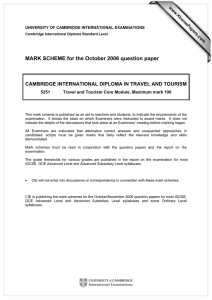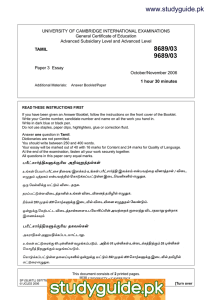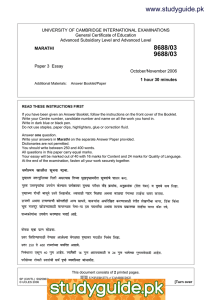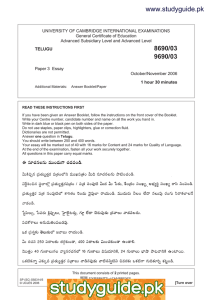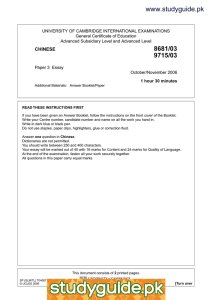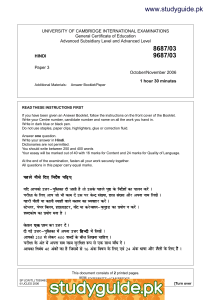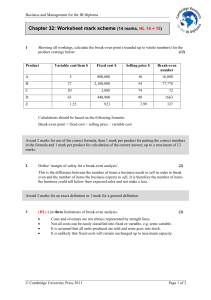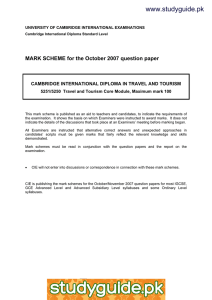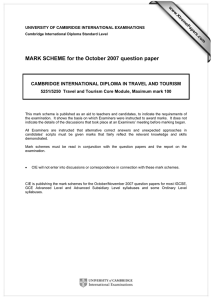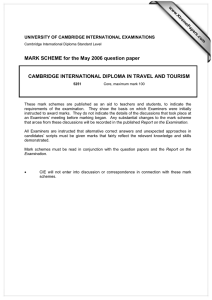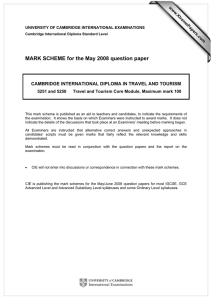www.studyguide.pk MARK SCHEME for the October 2006 question paper
advertisement
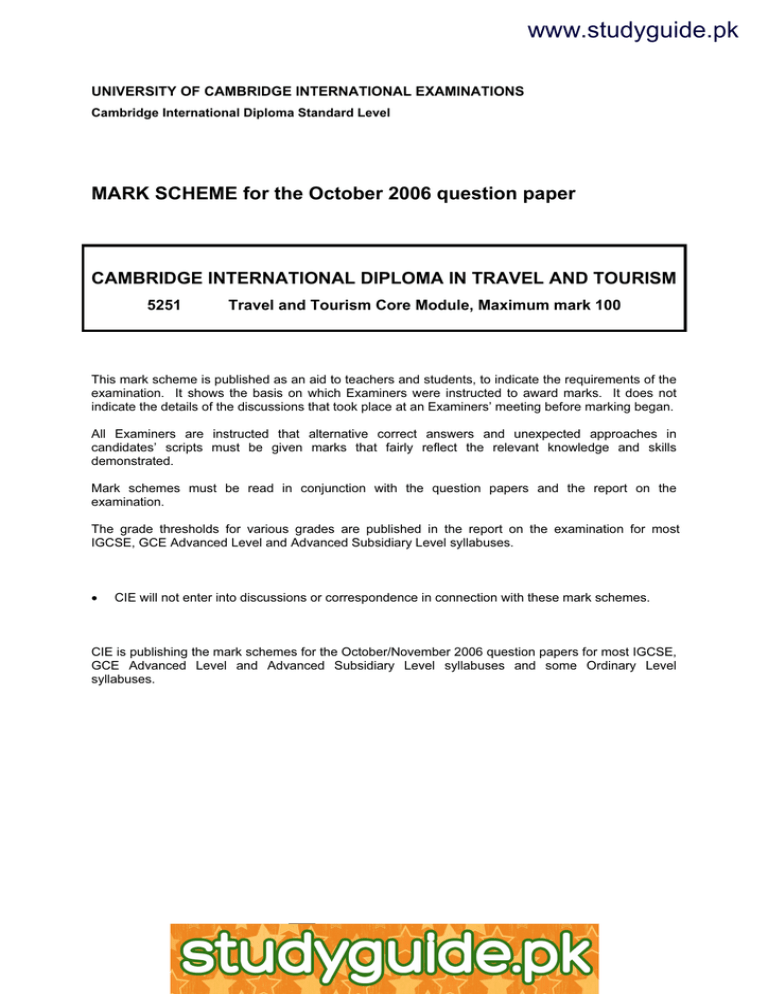
www.studyguide.pk UNIVERSITY OF CAMBRIDGE INTERNATIONAL EXAMINATIONS Cambridge International Diploma Standard Level MARK SCHEME for the October 2006 question paper CAMBRIDGE INTERNATIONAL DIPLOMA IN TRAVEL AND TOURISM 5251 Travel and Tourism Core Module, Maximum mark 100 This mark scheme is published as an aid to teachers and students, to indicate the requirements of the examination. It shows the basis on which Examiners were instructed to award marks. It does not indicate the details of the discussions that took place at an Examiners’ meeting before marking began. All Examiners are instructed that alternative correct answers and unexpected approaches in candidates’ scripts must be given marks that fairly reflect the relevant knowledge and skills demonstrated. Mark schemes must be read in conjunction with the question papers and the report on the examination. The grade thresholds for various grades are published in the report on the examination for most IGCSE, GCE Advanced Level and Advanced Subsidiary Level syllabuses. • CIE will not enter into discussions or correspondence in connection with these mark schemes. CIE is publishing the mark schemes for the October/November 2006 question papers for most IGCSE, GCE Advanced Level and Advanced Subsidiary Level syllabuses and some Ordinary Level syllabuses. www.xtremepapers.net www.studyguide.pk Page 2 Q. No 1(a) 1(b) 1(c) 1(d) 1(e) Mark Scheme Cambridge International Diploma – October 2006 EXPECTED ANSWER Direct services are not asked for so award one mark for each of three correct carriers such as: BA, Emirates, Etihad, Air France, KLM etc Award one mark for each of two valid reasons and a second mark for an appropriate explanatory comment. Correct ideas will include: • Improved customer service – attract families • Competitive advantage – usp. Airlines unique selling point Award one mark for the identification of each of three valid services and a second mark for each if appropriately described. Credit aspects such as: • Lone traveller meet and greet – escorted through passport control and supervised preboarding • Seated near cabin crew – supervision • Child meals – different menu • Activity pack etc. – entertainment • TV/video channel – entertainment • Families with children – board plane first • Bassinets – for infants This should be very familiar and credit all skills needed by cabin crew – award one mark for the identification of each of three appropriate skills/qualities and a second mark for each if properly explained e.g. • Foreign language – international passengers • First aid – health and safety of passengers • Communication – passenger instructions • Numeracy – selling duty free stock etc. Allow all valid ‘soft’ skills. Use level of response criteria Many carriers now offer inclusive tours and candidates should refer to at least one such company, providing some reasoning about their operations. Level 1 (1-2 marks) will tend to be generalised but should grasp the idea of filling seats on selected routes and the establishment of links with accommodation providers at selected destinations. UP TO 2 IDENTIFICATIONS CREDITED. Level 2 (3-4 marks) will begin to suggest the ideas of integration and/or the achieving of economies of scale. Profitability and increased revenue should be clearly stated. ANAYSIS OF TWO REASONS. Level 3 (5-6 marks) better candidates will clearly talk about integration and provide details of a known example such as Emirates/Emirates tours and come to the conclusion that the introduction of tour operations has been a logical extension of their business. © UCLES 2006 www.xtremepapers.net Syllabus 5251 Mark 3 A.O. 4.4.1 4 3.1.1 3.1.3 3.2.1 6 1.1.2 6 3.2.1 3.2.2 6 1.1.1 1.1.2 4.2.1 www.studyguide.pk Page 3 2(a)(i) 2(a)(ii) 2(a)(iii) 2(b) 2(c) 2(d) 2(e) Mark Scheme Cambridge International Diploma – October 2006 34 °C (accept 34-36 °C or 93-97 F) 7 hours None Award one mark for each of two valid reasons and then a further mark for an explanatory statement about each. Valid ideas will include: • Red sea coast – all year warm water – 20 F+ with good visibility • Coral reefs – one of world’s best sites • Marine life – wide variety Award one mark for each to a maximum of four from: • Mount Sinai • The Coloured Canyon • St. Catherine’s Monastery • Jeep safaris • Camel safaris This is very specific and candidates must base their responses on points from Fig. 2. Award one mark for the identification of each of four valid negative socio-economic impacts and a second mark can be given for the explanation of each. Credit ideas such as: • Contrasts in wealth increase – those in resort versus outside ‘traditional’ society • Muslim country – alcohol availability (can also credit western dress) • Ramadan – food/drink/smoking restrictions • Tipping – not everyone will • Local currency not accepted in some hotels – suggests leakage will be rife • Modern cafés versus traditional sites – cultural changes and strains etc. • Rapid development – old cannot cope etc. CREDIT ALL GENERIC NEGATIVE IMPACTS IF APPLICABLE TO EGYPT. Use level of response criteria This invites the candidate to consider how destinations can sustain increasing visitor numbers and agreement with the proposition is expected. The better answers will offer appropriate illustration and exemplification of key points. Level 1 (1-2 marks) will rely on simpler statements about improved or new resort facilities rather than the wider infrastructure within the destination. Level 2 (3-4 marks) will link rising numbers with expanded air/rail/sea/road handling capacity as well as accommodation. There may be valid comment about types of visitor – business versus leisure – and the facilities needed to attract them in increasing numbers. Level 3 (5-6 marks) will come to a conclusion about the infrastructural improvements that have been put in place in a destination to support visitor growth, with some actual examples to illustrate what happens. © UCLES 2006 www.xtremepapers.net Syllabus 5251 1 1 1 4 2.2.4 2.2.4 2.2.4 2.4.1 2.4.2 4 3.4.1 8 1.2.2 1.2.4 6 4.3.1 www.studyguide.pk Page 4 3(a)(i) 3(a)(ii) 3(a)(iii) 3(b) 3(c) 3(d) 3(e) Mark Scheme Cambridge International Diploma – October 2006 One mark for each of – Guided tours of Bruges, Ghent and Ypres £278 £102 Look for one or two aspects of appeal with some developed explanation about either/or both, awarding one mark for correct identification and up to three marks for appropriate amplification, marked to candidate’s advantage, such as: • Boat follows route through old city – best views, probable commentary, foreign language • Book in advance – many offer evening dinner cruise, romantic setting, good for couples • Good for people with mobility problems etc. Look for any four stages/steps in the operation or organisation of such a tour, awarding one mark for each valid stage such as: • Meet at set point/time/follow route • Limited numbers per group • Guide provides info (printed and spoken) • Sites of historical/cultural appeal • Tours sold to other operators • Advertised and promoted by TICs etc. Award one mark for each of three valid reasons and then award a second mark if a suitable explanatory comment is provided. Correct ideas include: • Convenience – car is door-to-door • Cost – more economic for touring • Flexibility – not run to timetable • Road networks – accessible • Choice of ferry routes – special offers etc. Use level of response criteria The stimulus material on Bruges should provide a good lead for this. Accept any city, provided it does have identifiable cultural appeal. History, Art, Music, Theatre, Literature etc. are all acceptable. Level 1 (1-2 marks) will tend to list attractions present in a named city without any real attempt to identify their cultural appeal. Level 2 (3-4 marks) will consider at least two types of cultural attraction pointing out their significance as attractions to visitors. Level 3 (5-6 marks) will illustrate different types of cultural attraction in at least one chosen city and will clearly emphasise their attractiveness. Better answers will indicate the relative importance of named cultural attractions. © UCLES 2006 www.xtremepapers.net Syllabus 5251 3 3.4.1 1 1 4 3.4.1 3.4.1 2.4.3 2.4.1 4 4.2.1 6 4.4.3 6 2.3.2 2.4.1 www.studyguide.pk Page 5 4(a)(i) 4(a)(ii) 4(b) 4(c) 4(d)(i) 4(d)(ii) 4(e) Mark Scheme Cambridge International Diploma – October 2006 Look for two explanatory statements about each of these natural features, awarding one mark for each of the two statements. Points must directly relate to Fig. 4. Correct ideas include: • Spectacular scenery – not yet developed • White water rafting – adventure activity • Rainforest views – attracts ‘green’ visitors • Major trekking route – adventure tourists • Has bridge viewpoints and crossings – wilderness environment Look for three explanatory comments based on details given in Fig. 4: • 4-day 4WD • canoeing • wildlife spotting • camping bush style This requires candidates to identify problems and outline a solution being used for each. Award one mark for each of three valid strategies and an additional mark if method of control/management described. Valid ideas include: • Footpath erosion – re-building • Congestion – signage, new paths/routes, guides • Litter – bins, signs, ‘country code’ • New building – planning controls Award one mark for each of three valid statements relating to each scenario. • Information on hostels • Maps of city and area • Transport details/ticket booking • Bureau de Change Allow one generalisation • Car hire • Hotel booking • Event/theatre booking • Destination Guide in Japanese etc. Allow one generalisation Use level of response criteria This is set in the context of section 1.4 and look for details and ideas about tourism generation. The better candidates will identify that MEDCs generate leisure travellers and that destinations are actively trying to attract these high spending visitors. Level 1 (1-2 marks) will offer generalised comment broadly in agreement but lacking accurate exemplification Level 2 (3-4 marks) will explain that destinations seek to attract MEDC visitors and provide one or two appropriate illustrations Level 3 (5-6 marks) will widen the argument and come to the conclusion the LEDC nationals cannot afford to travel to destinations appealing to and priced for MEDCs. Reward valid economic arguments. © UCLES 2006 www.xtremepapers.net Syllabus 5251 2 2.4.2 2 2.4.2 3 4.2.1 6 1.2.3 3 1.1.1 1.3.2 3 1.1.1 1.3.2 6 1.4.1 1.4.2
